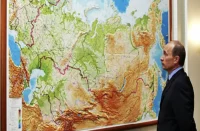Konstantin Penzev (Russia)
The Great Game obviously did not end in 1907 with the signing of the Anglo-Russian Convention. Given that, we should adjust the definition of the term, i.e., move away from its narrow meaning of the Anglo-Russian conflict in Central Asia during just the 19th century.
In a general sense, the Great Game is a military, political, economic, ideological, etc. struggle for dominance in Eurasia. Control of Eurasia would give a player a chance at ruling the world, so what we are really talking about is a struggle for world domination. That, by the way, should not be confused with the conspiracy theory of a World Government. In my opinion, the creation of the notorious World Government, strange as it may sound, is not such a big problem. When it comes right down to it, if you, the reader, feel an urgent need for one you can create it and invite any members of your family that you wish to join. The main problem is this. Who would submit to such an institution? Surely you don’t intend to run an entire continent by the “self-fulfilling prophecy” method? If not, we should discuss other things, specifically military and industrial capabilities.
Why Eurasia? Is it that important? How is it significant?
We are going to avoid reinventing the wheel here and instead consult the well-known US political figure Zbigniew Brzezinski, who was absolutely correct when he said America’s global leadership is directly dependent on how long and how effectively it can maintain its supremacy in Eurasia. He was right. In fact, about 75% of the world’s population lives in Eurasia; a large part of the world’s physical wealth is located here; and Eurasia has about three fourths of the world’s known energy reserves and approximately 60% of global GDP. Most importantly, its share of global GDP is rapidly growing. According to Samuel Huntington, who also need not be introduced, China had the largest economy in the world for a large part of history. He wrote that the spread of technologies and economic development of non-Western societies in the second half of the 20th century would restore that historical pattern.
China and India were major productive regions in Eurasia during the Agrarian Age, and nothing will prevent them from occupying the same position in the Industrial Age. Neither the Chinese nor the Indians have ever been backward in terms of culture and science. Their rate of progress slowed somewhat during the 19th and 20th centuries due to the colonial policies of the West, but colonialism is over now. China and India today are nuclear and space powers. Their huge advantage is that these regional civilizations have favorable climates, extremely large populations and access to the oceans of the world.
Thus, if Eurasia is the chief geopolitical prize in the global political game, the main geopolitical prize in the Great Game, cynically as it may sound, was and is India and China. It is on these civilizations that the countries involved in the global political and economic process will focus during the 21st century.
Every game has its rules, including the Great Game.
Rudyard Kipling wrote the first rule in his novel Kim. “When everyone is dead the Great Game is finished. Not before.”
The second rule of the Great Game is that nobody can win all the time; you can only get a temporary advantage.
Now we come to the most interesting question. Who are the players in the Great Game? Here is the answer. The game in Eurasia has two sides. In the most general terms, they can be called Land Powers and Sea Powers. That terminology was introduced by Halford John Mackinder (1861-1947), a British scholar and politician who held a high position in the world of British politics, which he had a great deal of influence on. Mackinder helped draft the Treaty of Versailles. We can now judge quite objectively what the provisions of that document led to. Among other things, the treaty provided for the establishment of the limitrophe states that were to separate Germany and Russia.
However, the Land Powers and Sea Powers are a separate issue. Still, we should mention that the Land Powers are none other than the peoples of Russian civilization, primarily the Great Russians since they, strictly speaking, control Eastern Europe. The current Sea Powers are the Anglo-Saxons and their 19th and 20th century state entities—Great Britain and, now, the United States.
It may appear to the reader that all of this talk about land and sea powers is nothing more than political mysticism. Actually, there is no mysticism here. The might of the Land Powers is based on overland trade in Eurasia, while maritime trade is in the hands of the Sea Powers. Should anyone think otherwise, let him tell me why the United States needs a navy capable of controlling all of the oceans of the world. The construction costs of aircraft carriers are so high that they can blow any kind of mysticism out of the water.
Pay particular attention to this next point. Dominance of Eurasia by the Land Powers lasted from ancient times to the age of great geographic discoveries. After the end of the first millennium BCE, that dominance was based on control of the Great Silk Road. The sea-faring states surged following the discovery of America by Columbus and the Spanish invasion of the New World, and primacy in world politics gradually shifted to the Sea Powers. The defeat of the Invincible Armada confirmed Great Britain’s maritime hegemony, and World War II brought US might to a peak.
Here is another question—one we can argue endlessly over. This question concerns the geopolitics of Eurasia. It is customary to distinguish several major macro-civilizations in Eurasia. Every author writing on the topic has his own point of view on how they break out. Huntington, for example, considers Japan a separate civilization, while I believe Japan is a typical limitrophe, a state in a “buffer” zone between civilizations. In this case, Japan is a buffer between the Atlantic West and Russia.
You can read about the other views in The Grand Chessboard by Zbigniew Brzezinski and Clash of Civilizations by Samuel Huntington, among others. In my opinion, there are five centers of civilization in Eurasia, along with inter-civilizational limitrophe zones. They are China, India, the Islamic civilization (Southwest Asia), Europe and Russia.
Please note that I use the term “Europe,” and not “the West.” The fact is that, geopolitically, the West is not homogeneous and is divided into Continental Europe and the Atlantic. The center of the latter is Great Britain and the United States. Between these two parts of Western civilization there is a deepening “transatlantic rift” that threatens to split the West into two different civilizations.
In a purely economic sense, Russia stands little chance at having an abundance of material things. All of its supposed natural wealth, about which the media constantly reminds us, is located in a harsh continental climate zone. In broad terms, in an international market (I emphasize, international) this natural wealth may be required only when resources located in zones with a more favorable climate and lower extraction costs have been significantly depleted, i.e., in the distant, and perhaps very distant, future. Major General A. E. Yedrikhin (Vandam) of the Russian Army’s General Staff, whose ideas have been underappreciated, had it about right when he said 100 years ago that “the Russian people are doomed by their geographical location to an insular, poor and thus discontented existence.”
If a person in China needs one dollar to live in the climatic conditions between the Yangtze and the Yellow Rivers, a Russian requires at least five dollars in the conditions prevailing between Kolyma and Kamchatka.
Only intense military, political and, no less important, engineering and scientific efforts can compensate for the effect of geography and climate on the Russian peoples.
The first thing we should be completely clear about is this. Without the latest weapons and a guaranteed capability to destroy any potential aggressor, Russia amounts to exactly nothing.
The second thing we must be absolutely clear on is that Russia’s rivals are neither China nor Islamic civilization, both of which well-wishers across the Atlantic and their agents persist in pushing Russia to oppose. Nor is India especially a rival. As far as Europe is concerned, while it is a geopolitical vassal of the United States today, we can secure its neutrality by establishing close economic relations with Germany and France. That is all the more possible since the militaries of both countries in the past spent time on Russia’s snow-covered expanses and drew a number of important conclusions from that experience.
The third important observation is this. Russia’s only natural opponent and even enemy is the United States, but not because Russians disagree with Anglo-Saxons on human rights and the prospects for developing democracy. The United States is Russia’s opponent because it is a maritime hegemony. If Brazil were to become a maritime hegemony tomorrow, it would find itself in opposition to Russia. Russia is the United States’ enemy not because Russians as a nation are inclined to authoritarianism, and not because Anglo-Saxons have an innate dislike of nested dolls, balalaikas and vodka, but because Russia’s geostrategic location enables it to dominate all Eurasia, and its rail network is easily able to connect China and Europe, a circumstance that arouses no feeling of tenderness in the Atlantic.
Finally, one last thing about which there should be no doubt.
Small countries without enough natural resources and the necessary human potential in both a qualitative and quantitative sense will always be dependent on powerful civilization-states that are capable of independent industrial development and scientific growth. It is unlikely that a little country with a small population can develop an independent industry and thus develop and manufacture its own modern weapons.
Konstantin Penzev is a Russian historian.
Source: New Eastern Outlook
RELATED POST:














Pingback: When Will the Great Game End? | Oriental Review